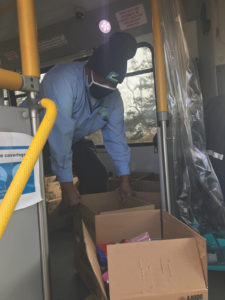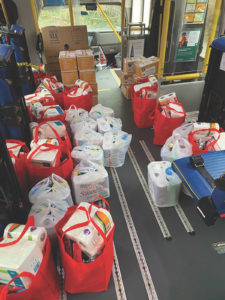As food insecurity has continued to grow across Cape Cod during the pandemic, a hidden issue has come into view alongside it. Sometimes, people go hungry not because there is no food to be had, but because they lack the ability to go shopping or pick up meals being offered by local groups.
Now some new joint endeavors are cropping up to make a difference.

Andrea Marczely, the food access coordinator at the Cape Cod Cooperative Extension, a county food and health services office, was searching for solutions to the food access problem last December.
“We heard one of the biggest obstacles is transportation,” she said. She reached out to the Cape Cod Regional Transit Authority (RTA), which runs bus routes, to set up a brainstorming session. “They immediately responded with an offer to help,” Marczely said.
Thomas Cahir, the administrator at the transit authority, said it had removed some of the seats in smaller buses used for its Dial-a-Ride on-demand transit service in order to allow for delivery of food.
“The pandemic has caused us to think differently in a number of ways,” Cahir said. “Food is difficult for a lot of seniors, who are hesitant to go into grocery stores.” The RTA was glad to pitch in, he said.
The food delivery program rolled out in January, with the Cooperative Extension handling coordination between social service organizations, the transit authority, and food pantries.
The Lower Cape Outreach Council secures the food and serves as the RTA pickup point for deliveries on the Lower and Outer Cape. (Falmouth Service Center serves the same role for the Upper Cape, and Hands of Hope Outreach Center for the mid-Cape.)
Now, Cahir said, the transit authority’s buses are on the road every day making deliveries. RTA manager Dennis Foster has gone out on a few runs himself. “There have been a lot of younger families on all the runs I’ve been on,” he said. “I think the need is acute. Families are struggling.” Food recipients are very thankful, Foster added.
Gennie Moran, chief operating officer of the Lower Cape Outreach Council, confirmed there has been a dramatic increase in households using its food pantry. In 2019, the pantry served 4,671 households. In 2020, the number jumped to 6,994 — a 50-percent increase.
The transit authority’s delivery system is also used to provide food to people in quarantine. Marczely has established a relationship with the Cape’s regional coordinator for the state’s Covid-19 contact tracing program. Now, contact tracers ask those who must quarantine whether they are in need of food.
If they are, the names are passed to Marczely. The extension service then coordinates with local pantries and turns to the RTA for delivery. “The RTA is great,” she said.

The Family Pantry of Cape Cod has also taken action on the delivery problem, running a mobile pantry out of Harwich that delivers to five communities: Chatham, Dennis, Brewster, Eastham, and Provincetown.
Those deliveries have taken shape through partnerships with the councils on aging, said Executive Director Christine Menard, who agreed this has been a remarkably busy year. Once a month, she said, they deliver enough for 30 to 60 families to each council on aging. And recently, the Family Pantry added a second delivery truck.
Provincetown’s Council on Aging Director Chris Hottle said that, since the beginning of the pandemic, participation in the mobile food program has gone up by 28 percent.
Food insecurity in Provincetown is high. “I think it’s the economics here,” Hottle said. “There are so many seasonal workers, and real estate is so high. It’s expensive and isolated.”
The Family Pantry provides the COA with a list of available items, which include meats, dairy products, and baked goods. The COA contacts program participants and submits their list of needs to the Family Pantry, where orders are packaged.
On delivery day, volunteers help unload the truck. And while the senior center offers drive-through pickup for those who have transportation, some of the bags go into the COA’s vans. Those are for delivery to those who can’t drive to the senior center, Hottle said.
On a smaller scale, putting meals on wheels has been important to the success of two Wellfleet efforts to feed more people.
The nonprofit Common Table, run out of the Fox & Crow Café on Commercial Street, has been delivering breakfasts to recipients in Eastham, Wellfleet, and Truro since the start of the pandemic. Common Table is a separate entity from the café, but owner Trudy Vermehren is involved in the nonprofit food program, working alongside Kristen Shantz and other volunteers who prepare, pack, and deliver morning meals Monday through Friday. They’re delivering about 70 meals per day, on average, Vermehren said.
On Wednesdays, the breakfast delivery may include a quart of soup.
The 246 Community Kitchen at the Wellfleet United Methodist Church cooks up about 50 quarts each Tuesday. The ingredients are donated, said Janet Drohan, director of the Community Kitchen. Two weeks ago, the menu featured clam chowder, with clams donated by local fishermen, served with loaves of loaves of bread donated by PB Boulangerie.
The kitchen has historically offered a community dinner on Tuesday nights, but due to pandemic-related restrictions, it has become a drive-through take-out operation. Now on Tuesdays, participants who have registered receive a quart of soup, loaf of bread, and bag of salad. Any soup that’s left over is brought to the Common Table for delivery to their recipients.
